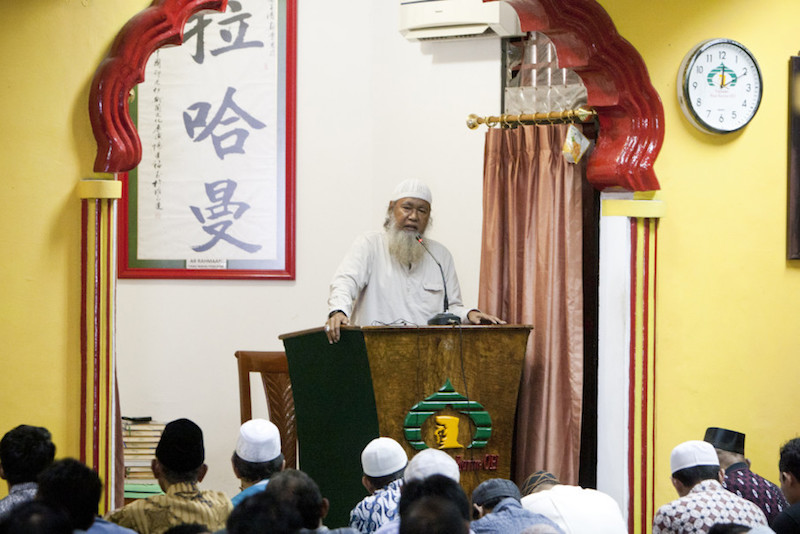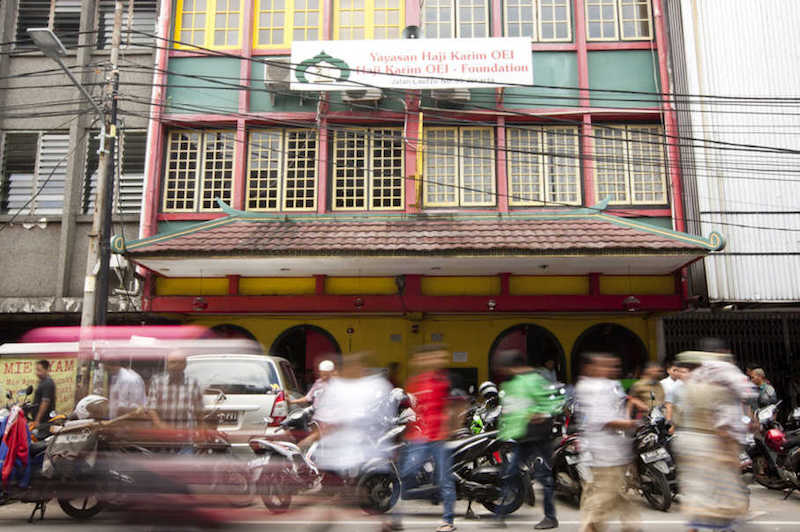JAKARTA, March 30 — Red, yellow and green walls, Chinese-style tiled roof, bright yellow boxed windows, Chinese calligraphies hanging everywhere — you’d be forgiven for thinking that this building, nestled in a corner of busy Pasar Baru in Jakarta’s Chinatown, is a klenteng, a Chinese-Buddhist temple.
But no, alongside the Chinese calligraphies also hang Arabic ones, quotations from the Koran done in an illustrative style.
Yes, the three-story building is actually a mosque, called Lautze after the street where it’s stood since 1991.

The Jakarta Globe visited the mosque last Friday to talk with the imam of the mosque and its regular visitors.
Iwan Tan, a 45-year-old Chinese-Indonesian man who converted to Islam 12 years ago, said he has been visiting Lautze Mosque every week to do his Friday prayer since 2009.
“I knew about the mosque from my wife. She saw it on the news,” Iwan, a former Buddhist, said.
The cargo company owner said he likes going to the mosque because here he can meet up with other Chinese-Indonesian Muslims.
Iwan said Lautze Mosque is very welcoming to Chinese-Indonesians like him who want to find out more and learn about Islam. Many of them end up converting to the religion.
“I feel welcomed here. It’s small, but the brotherhood is very strong. The people here are very open,” Iwan, a graduate from an Australian university, said.

Nationalist beginnings
The Lautze Mosque was established in 1991 by the Haji Karim Oei Foundation, which was named after the prominent nationalist and Chinese-Indonesian Muslim Abdul Karim Oei (1905-1988), whose Chinese name was Oie Tjeng Hien.
The foundation’s main aim is to promote Islamic teachings to Chinese-Indonesians, a minority group in the archipelago.
“The mosque’s location, in a predominantly Chinese community, was intentional. We want to spread the teachings of Islam, especially the moderate views of Indonesian Muslims,” Mohamad Ali Karim Oei, the current head of the foundation, said.
Ali, the son of the late Abdul Karim Oei, said they rented a three-story shophouse and turned it into a mosque in 1991.
The original building stood for two years before it was expanded to the shophouse next door in 1994 after receiving a grant from former president Suharto.

Despite its relatively young age, the Lautze Mosque has become a symbol of the assimilation between Chinese and Islamic cultures and traditions in Indonesia.
Karim Oei Foundation has established a second mosque in Bandung after realising a Chinese-Indonesian Muslim community is growing rapidly in the West Java capital.
Unlike regular Indonesian mosques, the Lautze Mosque is open only from 9am to 5pm, except during the fasting month in Ramadhan when it is open 24 hours.
62-year-old Ali, whose Chinese name is Oei Tek Lie, said the foundation took a lot of its inspirations from his father’s strong character.
“My father was a unique figure. He was Chinese, but was vehemently against the Japanese occupation during the Second World War and threw his support behind Indonesian independence fighters,” the father of three said.
Ali said now some of the original founders of the mosque have died. He hopes the next generation will continue the mosque’s aim to promote moderate views of Islam to the public. — Jakarta Globe






















